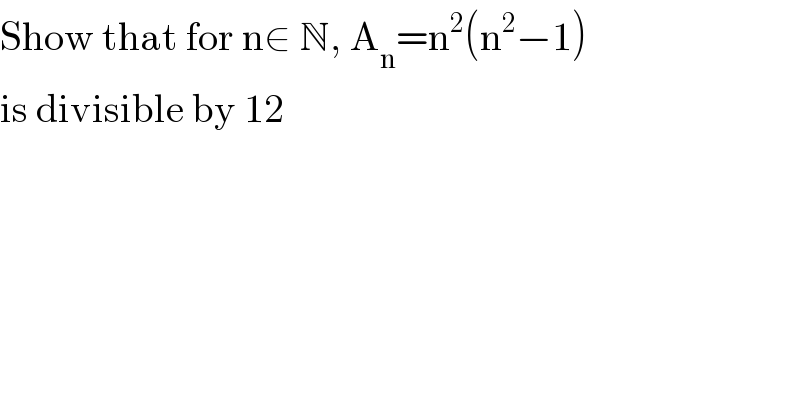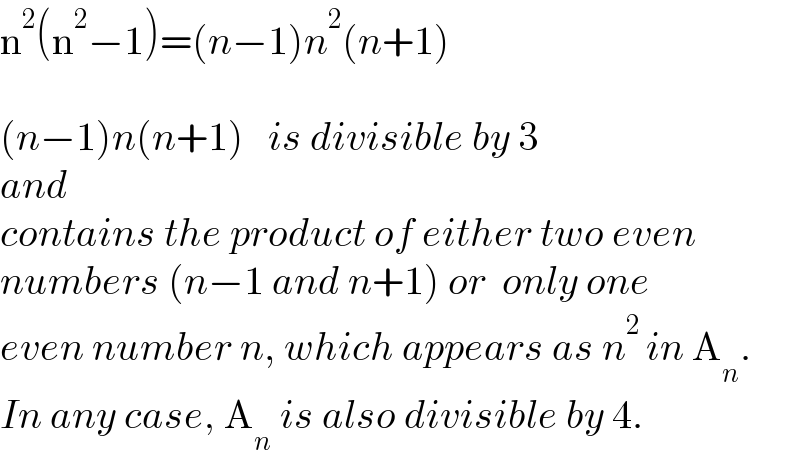
Question Number 142310 by mathocean1 last updated on 29/May/21

$$\mathrm{Show}\:\mathrm{that}\:\mathrm{for}\:\mathrm{n}\in\:\mathbb{N},\:\mathrm{A}_{\mathrm{n}} =\mathrm{n}^{\mathrm{2}} \left(\mathrm{n}^{\mathrm{2}} −\mathrm{1}\right) \\ $$$$\mathrm{is}\:\mathrm{divisible}\:\mathrm{by}\:\mathrm{12} \\ $$
Answered by MJS_new last updated on 29/May/21

$${A}_{\mathrm{6}{k}} =\mathrm{36}{k}^{\mathrm{2}} \left(\mathrm{6}{k}−\mathrm{1}\right)\left(\mathrm{6}{k}+\mathrm{1}\right) \\ $$$${A}_{\mathrm{6}{k}+\mathrm{1}} =\mathrm{12}{k}\left(\mathrm{3}{k}+\mathrm{1}\right)\left(\mathrm{6}{k}+\mathrm{1}\right)^{\mathrm{2}} \\ $$$${A}_{\mathrm{6}{k}+\mathrm{2}} =\mathrm{12}\left(\mathrm{12}{k}+\mathrm{1}\right)\left(\mathrm{3}{k}+\mathrm{1}\right)^{\mathrm{2}} \left(\mathrm{6}{k}+\mathrm{1}\right) \\ $$$${A}_{\mathrm{6}{k}+\mathrm{3}} =\mathrm{36}\left(\mathrm{2}{k}+\mathrm{1}\right)^{\mathrm{2}} \left(\mathrm{3}{k}+\mathrm{1}\right)\left(\mathrm{3}{k}+\mathrm{2}\right) \\ $$$${A}_{\mathrm{6}{k}+\mathrm{4}} =\mathrm{12}\left(\mathrm{2}{k}+\mathrm{1}\right)\left(\mathrm{3}{k}+\mathrm{2}\right)^{\mathrm{2}} \left(\mathrm{6}{k}+\mathrm{5}\right) \\ $$$${A}_{\mathrm{6}{k}+\mathrm{5}} =\mathrm{12}\left({k}+\mathrm{1}\right)\left(\mathrm{3}{k}+\mathrm{2}\right)\left(\mathrm{6}{k}+\mathrm{5}\right)^{\mathrm{2}} \\ $$
Answered by JDamian last updated on 29/May/21

$$\mathrm{n}^{\mathrm{2}} \left(\mathrm{n}^{\mathrm{2}} −\mathrm{1}\right)=\left({n}−\mathrm{1}\right){n}^{\mathrm{2}} \left({n}+\mathrm{1}\right) \\ $$$$ \\ $$$$\left({n}−\mathrm{1}\right){n}\left({n}+\mathrm{1}\right)\:\:\:{is}\:{divisible}\:{by}\:\mathrm{3} \\ $$$${and} \\ $$$${contains}\:{the}\:{product}\:{of}\:{either}\:{two}\:{even} \\ $$$${numbers}\:\left({n}−\mathrm{1}\:{and}\:{n}+\mathrm{1}\right)\:{or}\:\:{only}\:{one} \\ $$$${even}\:{number}\:{n},\:{which}\:{appears}\:{as}\:{n}^{\mathrm{2}} \:{in}\:\mathrm{A}_{{n}} . \\ $$$${In}\:{any}\:{case},\:\mathrm{A}_{{n}} \:{is}\:{also}\:{divisible}\:{by}\:\mathrm{4}. \\ $$
